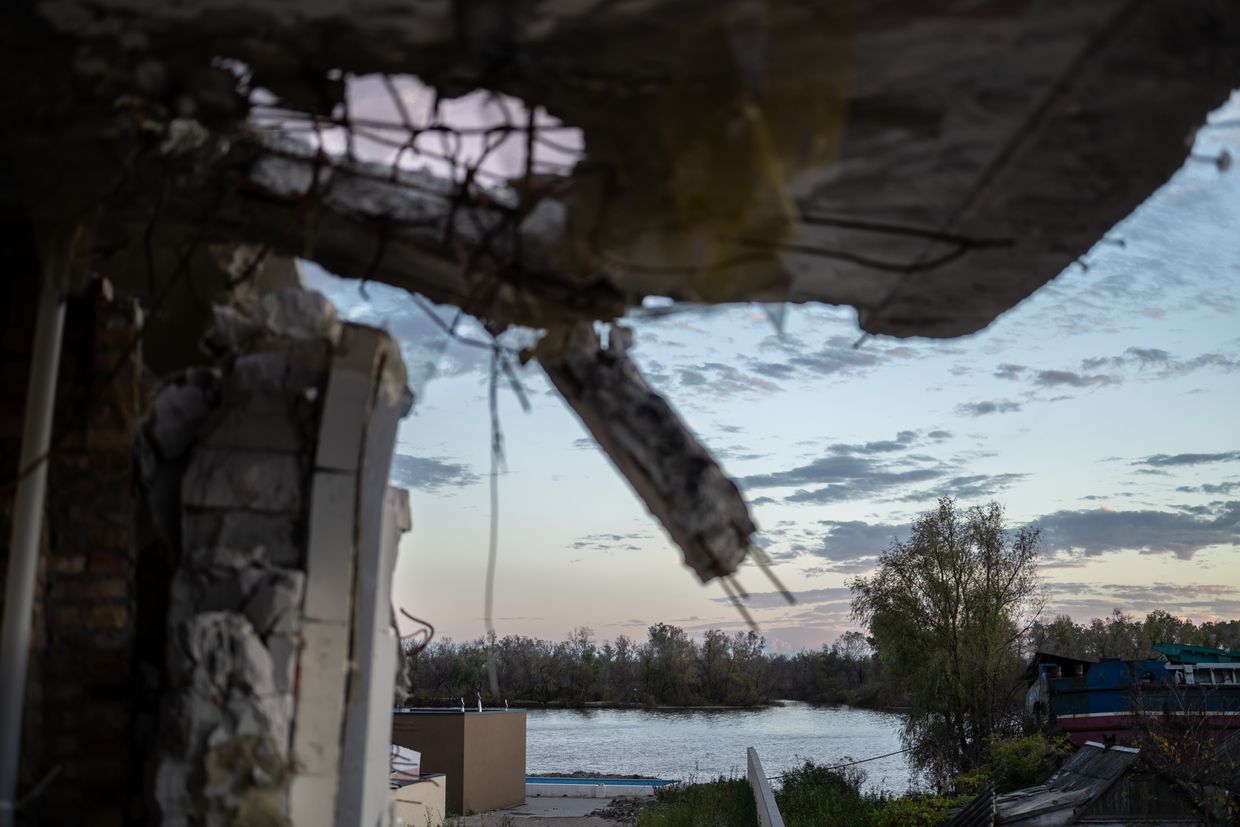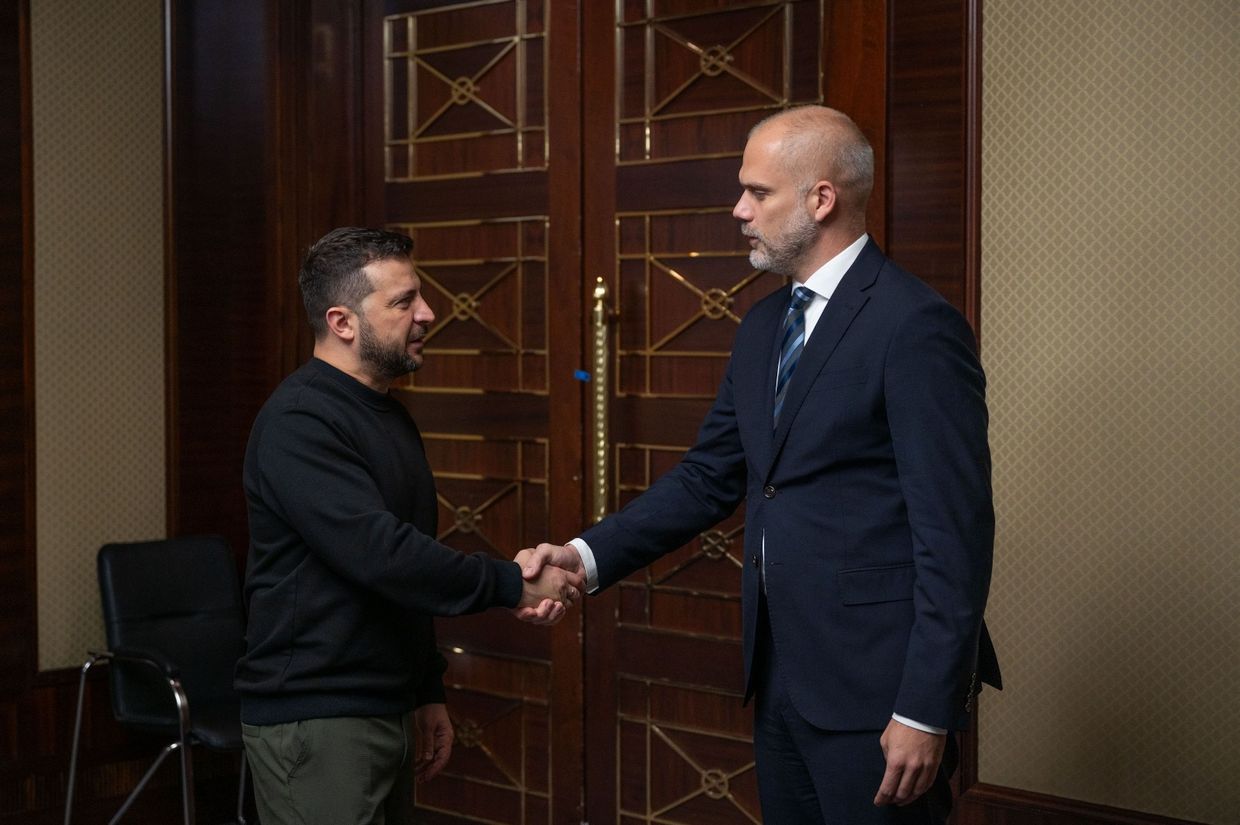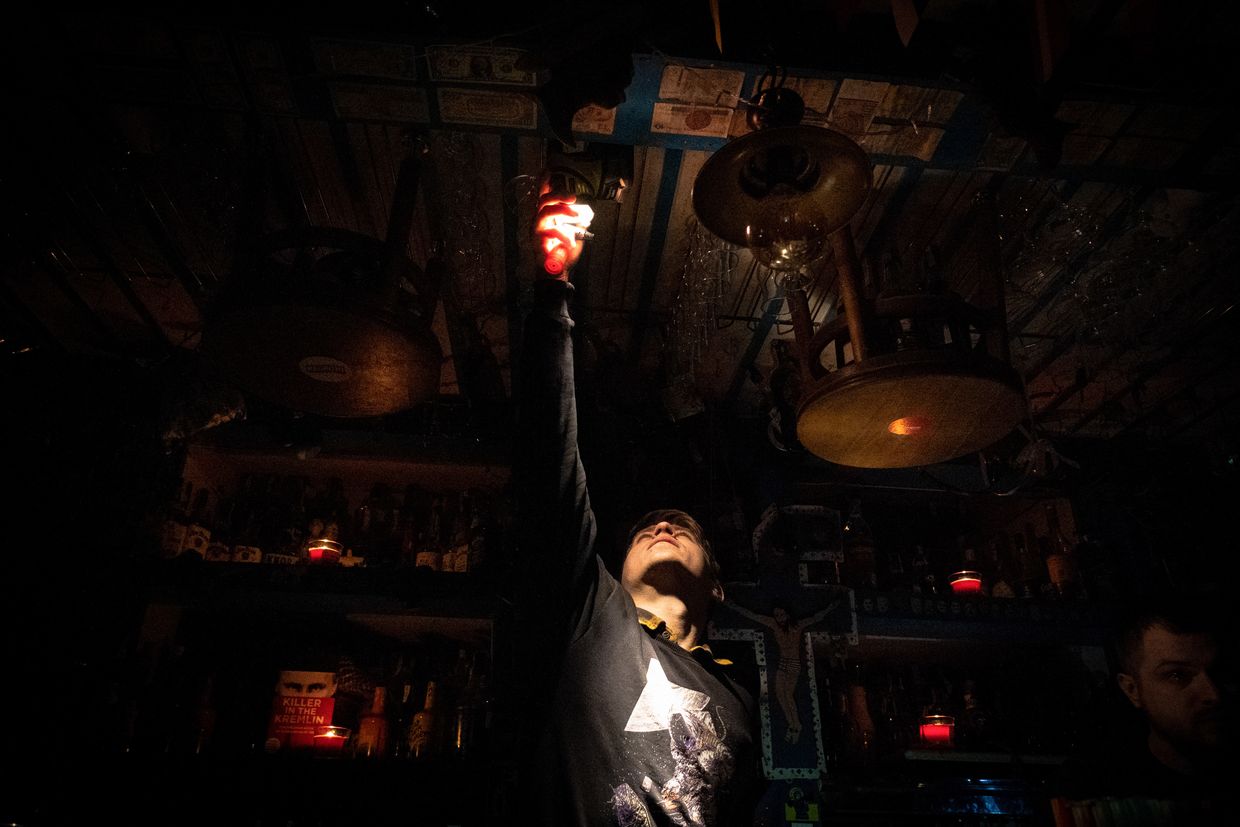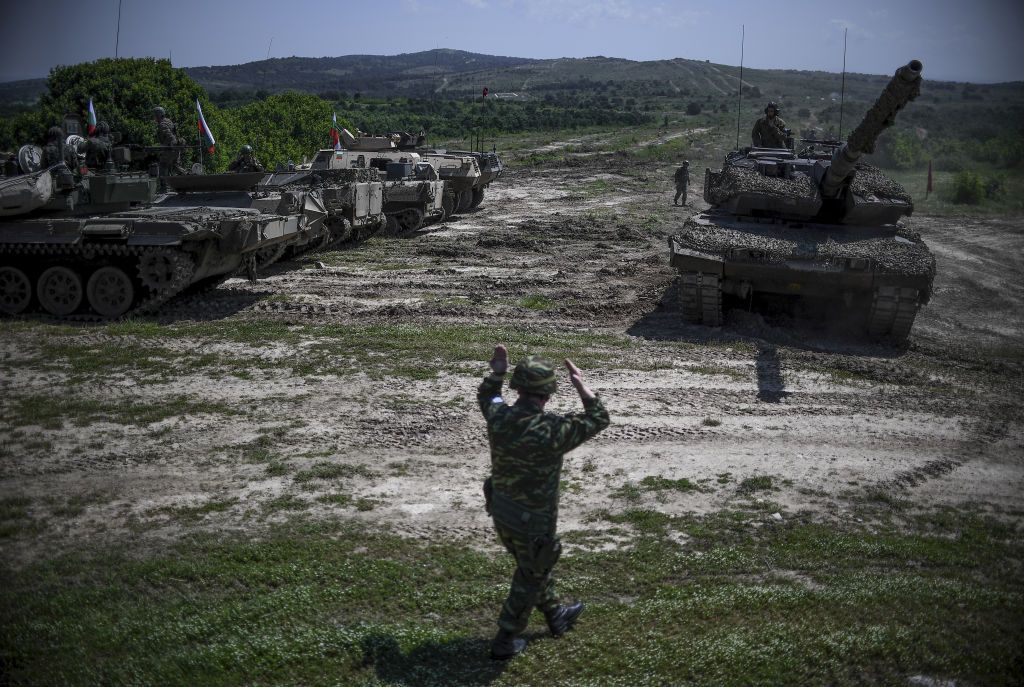Ukraine war latest: Ukrainian Marines say Russia has suffered close to 3,500 casualties in Dnipro River battles

Key developments on Nov. 17:
- Ukrainian Marines: Russia has suffered close to 3,500 casualties in Dnipro River battles
- BBC: 20,000 Ukrainian men have illegally crossed border since February 2022
- Zelensky: Kremlin planning campaign to destabilize Ukraine, potential coup
- Dutch defense minister announces $2 billion of military aid for Ukraine in 2024
- Energy giant DTEK calls for more air defense systems as winter looms
- Zelensky: Artillery munition deliveries to Ukraine have decreased since Israel-Hamas War
Russian forces have lost almost 3,500 soldiers, including more than 1,200 killed, as well as dozens of pieces of military hardware, in battles on the Dnipro River near Kherson, the Ukrainian Marines said on Nov. 17.
"The Defense Forces of Ukraine carried out a series of successful actions on the eastern bank of the Dnipro River in the direction of Kherson," they wrote on Facebook.
As of Nov. 16, the Marines said that Russian forces operating in the area had suffered 1,216 fatalities, 2,217 wounded and lost 24 tanks, 48 armored vehicles, 89 artillery systems and mortars, 135 other vehicles, nine multiple launch rocket systems, and 14 boats.
Ukraine has been conducting cross-river raids into the occupied part of Kherson Oblast east of the Dnipro River since February, with more intensified attacks reported in August.
The U.K. Defense Ministry said in July that Ukrainian forces are maintaining a beachhead near the Antonivsky Bridge.
Over the past weeks, Russian military bloggers reported that the Ukrainian military established footholds on the occupied bank, and geolocated footage from Oct. 19 confirmed Ukrainian presence in Krynky.
Russia has admitted that Ukrainian troops have been operating on the occupied eastern bank of the river.
Volodymyr Saldo, Russia-installed proxy in the occupied part of Kherson Oblast, said on Nov. 15 on his Telegram channel that small groups of Ukrainian soldiers were spread from a railway bridge in the oblast to Krynky, a village some 35 kilometers east of Kherson and two kilometers southeast of the Dnipro River.
President Volodymyr Zelensky also commented on the river battles, congratulating the soldiers operating there, as well as sharing photos of some of the amphibious operations.
BBC: 20,000 Ukrainian men have illegally crossed border since February 2022
Around 20,000 Ukrainian men have violated martial law and illegally crossed the border, BBC claimed on Nov. 17, citing information received from neighboring countries.
Authorities in Ukraine's neighbors, Romania, Hungary, Slovakia, Poland, and Moldova, said that 19,740 men had illegally crossed their borders between February 2022 and Aug. 31, 2023, according to the BBC.
In addition, the BBC said Ukrainian authorities revealed that more than 21,000 had been apprehended by border guards while trying to cross. The majority of those caught were attempting to walk or swim across the border, but almost 7,000 tried to use falsified documents.
The methods used by those who were successful are unknown, the BBC said.
Ukrainian men aged 18-60 have been forbidden to leave the country due to the martial law that has been imposed since the beginning of the full-scale invasion on Feb. 24, 2022. There are some exceptions allowed.
A nationwide inspection of Ukraine's recruitment offices in August 2023 revealed multiple violations, including corruption, abuse of power, and fraud, prompting President Volodymyr Zelensky to fire the heads of all regional military enlistment offices.
Zelensky said that a total of 112 criminal cases have been opened against Ukrainian enlistment officials, and 33 people have been charged.
This spotlight on problems within the military enlistment system in August did not mean the end of abuses there, however.
Ukraine's State Bureau of Investigation (SBR) revealed an "unprecedented" scheme on Nov. 1 in which regional military enlistment offices received bribes in exchange for helping people evade mobilization using forged documents.
The cost of arranging the creation of doctored medical forms or other falsified documents, as well as potentially assisting in actually leaving Ukraine, ranged from $6,000-10,000.
In addition, there have been instances of Ukrainian elites purportedly abusing their positions of power to leave the country illegally.
Lawmaker Oleksandr Dubinskyi has been investigated for allegedly falsifying documents to travel to Spain, as well as possibly helping an extended family member illegally cross the border. Dubinskyi is currently being held by Ukrainian authorities for high treason in an unrelated case.
Fedir Venislavskyi, Zelensky's parliamentary representative, told the BBC that the problem of corruption in enlistment offices was serious but that the Ukrainian government was cracking down on violations.
He also said that those who had left or tried to leave would not have any impact on Ukraine's war effort.
"Those who try to avoid mobilization are about 1-5%. They are definitely not critical to the defense of Ukraine."
Zelensky: Kremlin planning campaign to destabilize Ukraine, potential coup
Russia is plotting a destabilization campaign against Ukraine known as "Maidan 3," aimed at sowing chaos and ultimately fomenting a coup, President Volodymyr Zelensky told reporters on Nov. 16.
Zelensky cited information from Ukrainian intelligence, as well as information stemming from Western countries. He didn't provide documents to back his claim.
“Maidan is (a) coup for them, so the (name of the) operation is understandable,” Zelensky said.
Maidan refers to the 2014 EuroMaidan Revolution that led to the ousting of pro-Russian President Viktor Yanukovych, which culminated on Kyiv's Independence Square, known in Ukrainian as Maidan Nezalezhnosti.
The square was also the primary location of the 2004 Orange Revolution, where protesters demonstrated against an election widely seen as rigged.
The Orange Revolution prevented Yanukovych (in his first run for office) from becoming president. The pro-Western Viktor Yushchenko was declared the rightful winner of the election.
Maidan as a political term received its name from the 2004 protest.
Stirring up domestic discontent has been a regular strategy that the Kremlin uses to try and destabilize countries that Russia wants to control or have more influence over.
Moldovan President Maia Sandu alleged on Oct. 6 that Wagner Group founder Yevgeny Prigozhin had attempted a coup against her as part of a larger plot to destabilize the country.
The plot was ultimately unsuccessful, but Russia has continued to funnel money into Moldova to destabilize the country, including allegedly spending over a billion Moldovan lei ($55.5 million) to influence local elections earlier in November.
Dutch defense minister announces $2 billion of military aid for Ukraine in 2024
The Netherlands will make 2 billion euros ($2.2 billion) available for military support to Ukraine next year, Dutch Defense Minister Kajsa Ollongren said on Nov. 17.
"With this substantial amount, we send a clear signal that we are determined to continue our support to Ukraine, now and in the future," Ollongren said on X.
Speaking to Reuters earlier in the day, Ollongren said that the $2.2 billion pledge in additional military aid is critical as it would "safeguard our support for Ukraine and ensure continuity" ahead of November elections in the Netherlands.
The details of the new military aid are based on Kyiv's needs, and advanced drone technology could be included in the package, Reuters reported, citing Ollongren.
The Netherlands has so far provided 4 billion euros in military, financial, and humanitarian support to Ukraine since the start of the full-scale invasion, according to the German-based Kiel Institute.
The Netherlands is also one of the countries training Ukrainian pilots on F-16s.
Energy giant DTEK calls for more air defense systems as winter looms
Ukraine needs more powerful air defense systems, such as Patriot and IRIS-T air defense systems, to better protect its critical infrastructure from Russian attacks, Maksym Timchenko, CEO of Ukraine's largest private energy company DTEK, said on Nov. 17.
In an interview with Reuters in Warsaw, Timchenko said his country needs more of these Western-made systems for the safer operation of power plants as Russia continues to target energy sites in Ukraine.
Timchenko said that DTEK is ready for what is expected to be yet another brutal winter of Russian attacks on critical infrastructure, but "we cannot protect ourselves against ballistic missiles if we don't have air defense systems."
All 13 of DTEK's power stations, which supply power to more than seven million Ukrainian families, have been hit by Russian attacks, Reuters reported. Since April, eight of the 13 have been repaired and are operational, while another two are still being repaired.
Citing Timchenko, Reuters said that roughly half of DTEK's 2.4-gigawatt capacity has been destroyed, suffered damage, or is under Russian occupation.
DTEK's urgent call for more Western air defense systems comes as Kyiv braces itself for winter of power cuts and lack of other essential utilities such as heating.
From fall 2022 to Winter 2023, Russia launched a series of mass strikes across the country, targeting critical infrastructure sites and causing widespread power outages. Local authorities were forced to install power cut schedules to preserve electricity.
Top Kyiv officials, including President Volodymyr Zelensky, have urged Western allies to provide more air defense systems as winter approaches.
Speaking with journalists on Nov. 16, Zelensky said that he "does not believe that Russia will use fewer weapons" this winter but that Ukraine is better prepared now than last year.
So far, the power situation across the country has been rather stable, even as Russia continues to target critical infrastructure. In places like Kherson, a city in the south that is regularly shelled, electricians work swiftly to restore electricity to civilians as fast as possible, despite the danger.
Russia appears intent on raging on its energy campaign, however. On Nov. 16, DTEK reported that Russian shelling severely damaged one of its power plants in a front-line region for the fourth time.
DTEK did not disclose the location of the power plant.
Zelensky: Artillery munition deliveries to Ukraine have decreased since Israel-Hamas War
The delivery of artillery shells to Ukraine from Western allies has decreased since the beginning of the Israel-Hamas conflict, President Volodymyr Zelensky said on Nov. 16.
In particular, supplies of the much-needed 155mm artillery shells have "really slowed down," he said.
Zelensky added that the U.S. did not formally say that they would stop or decrease the flow of artillery shells to Ukraine but rather that "everyone is fighting for (stockpiles) themselves."
"This is life. I'm not saying that this is positive, but this is life, and we have to defend what's ours."
Despite comments from Western officials, including President Joe Biden, that support for Israel would not necessarily mean decreased attention towards Ukraine, there have been increasing signs that this may be the case.
Axios reported on Oct. 19, citing comments from Israeli officials, that 155mm shells originally earmarked for Ukraine were being redirected to Israel.
"Let’s be frank: the crisis in the Middle East is already having a lasting impact on our policy in Ukraine," said Josep Borrell, the EU's top diplomat, in a speech on Nov. 6.
Meanwhile, the U.S. Congress has failed to make any progress on discussions for a new funding bill for Ukraine in months.
President Joe Biden signed a temporary funding bill on Nov. 16 that prevented an impending government shutdown, but it did not include any aid for Ukraine.
The U.S. Defense Department (DoD) announced the latest funding package for Ukraine on Nov. 3, consisting of $300 million in aid from the Ukraine Security Assistance Initiative (USAI) and $125 million in drawdowns from DoD inventories.
DoD drawdowns are not limitless, and the press release noted that it "exhausts the remaining USAI funds currently available to support Ukraine."
Further funding will need to be approved by Congress.
















